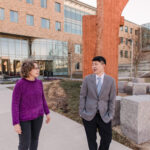
Meet Rachel Brubaker, M.A. ’00, historical studies, assistant director for grants and program development at the Dresher Center for the Humanities. Brubaker, a self-proclaimed humanities nerd, has worked in different positions at UMBC for 22 years, but her current seat in the Dresher Center allows her to combine her UMBC degree with her passion for public humanities and education to collaborate with faculty members on research proposals and help connect them to prestigious funding opportunities. Take it away, Rachel!
Q: What’s one essential thing you’d want another Retriever to know about you?
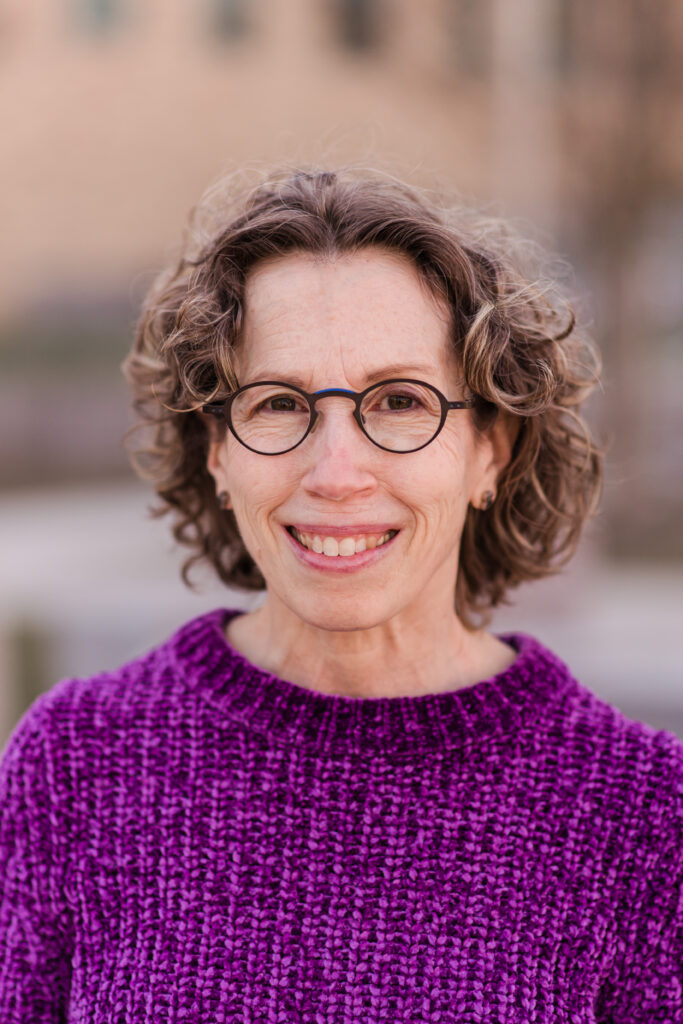 Rachel Brubaker, M.A. ’00 (Marlayna Demond ’11/UMBC)
Rachel Brubaker, M.A. ’00 (Marlayna Demond ’11/UMBC)
A: I have been assistant director for grants and program development in the Dresher Center for the Humanities for nearly 10 years. In that capacity, I assist faculty in the arts and humanities get prestigious grants and fellowships. It’s a joy to learn about their research projects and help bring them to fruition.
Before that I worked for 12 years in the history department on “Teaching American History” professional development grants with eight area school districts. I received my master’s degree in historical studies from UMBC in 2000 and prior to that directed the National History Day Program for middle- and high-school students.
In a different life, I was a graphic designer and education communications professional, but that’s old news. I am a proud history/public history/humanities nerd, and I love working with our faculty!
Q: Tell us what you love about your place of work.
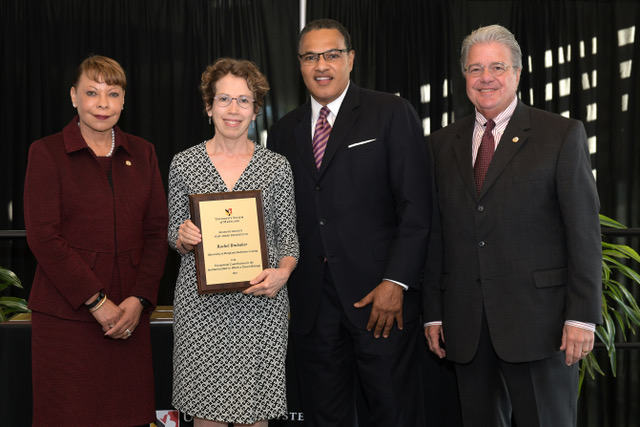 In 2019, Brubaker received the University System of Maryland Board of Regents’ Staff Award for exceptional contribution to the institution. Photo courtesy of Brubaker.
In 2019, Brubaker received the University System of Maryland Board of Regents’ Staff Award for exceptional contribution to the institution. Photo courtesy of Brubaker.
A: The Dresher Center is an interdisciplinary intellectual community in the truest sense. Our programs and grants support and promote faculty and graduate student research in the humanities at UMBC. We run a number of fellowship programs for faculty at all stages of their careers, and provide a temporary home for visiting and internal fellows to research, write, and think about the humanities in conversation with each other.
Our multi-year Inclusion Imperative program, funded by the Mellon Foundation, challenged us to put the tools of the humanities to use to further equity, inclusion, and social justice. With that charge, we have expanded our support for the public humanities at UMBC and formed a regional diversity teaching network of humanities scholars at area institutions who are doing similar work.
Q: What part of your job do you enjoy the most and why?
A: Collaborating with faculty on their research proposals. This often begins in learning about them and their works in progress. Finding the right support for them to write books, create digital projects, and collaborate with community scholars and partners is supremely gratifying!
“Think about UMBC not as an office, but as a community of like-minded people who value and produce knowledge and look to make a difference.
Rachel Brubaker, M.A. ’00
Q: Tell us about your primary WHY, and how it led you to UMBC.
A: I came to UMBC because I was transitioning from one career to another, and UMBC became the place to do it. I began as a freelance designer in OIA, then entered the M.A. program in historical studies. After finishing the program, I came back to help run grant programs in the Center for History Education in the history department. That led to my present position in the Dresher Center.
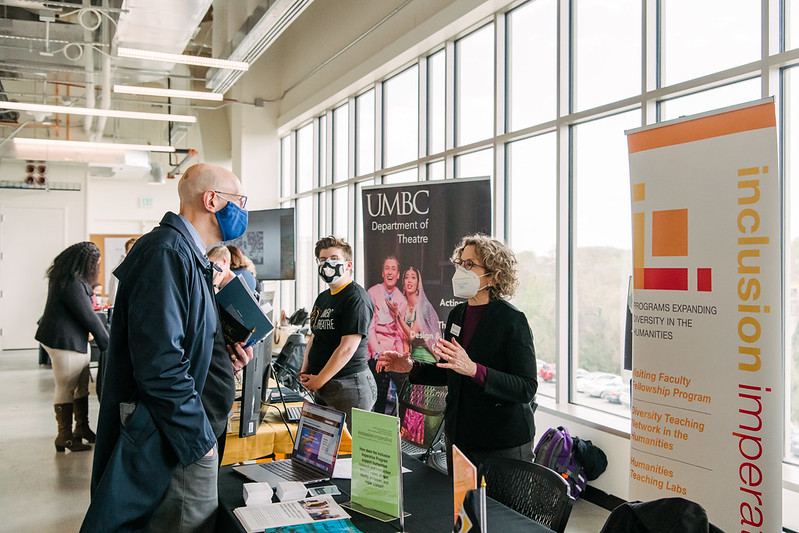 Brubaker presented at the RetriEVER Empowered event in May 2022. (Marlayna Demond ’11/UMBC)
Brubaker presented at the RetriEVER Empowered event in May 2022. (Marlayna Demond ’11/UMBC)
Q: Tell us about the people who have helped you at UMBC, and why their HOW made such a difference to you.
A: There are many people who have made a difference…too many to list, but I have truly appreciated the caliber of support and kindness from colleagues, who have challenged me and helped me grow in my career. I have become a better writer and thinker with their help.
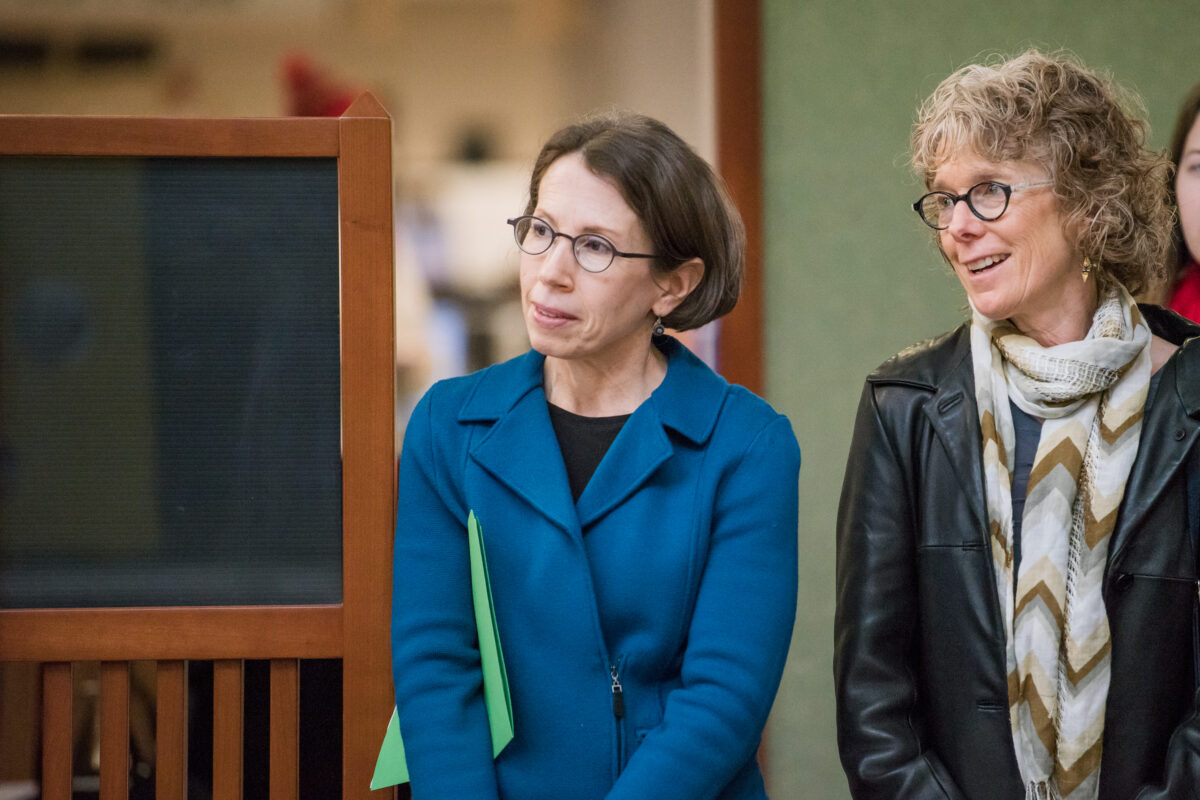 An activity that came out of the Inclusion Imperative are Humanities Teaching Labs (HTLabs). In 2018, a popular HTLab for faculty and students was the “Transcribe-a-thon,” commemorating the 200th anniversary of Frederick Douglass’s birth. Participants transcribed a portion of the Freedmen’s Bureau Papers for the Smithsonian Transcription Center and the National Museum of African American History and Culture. The national event was organized by the Colored Conventions program. Photo courtesy of Brubaker.
An activity that came out of the Inclusion Imperative are Humanities Teaching Labs (HTLabs). In 2018, a popular HTLab for faculty and students was the “Transcribe-a-thon,” commemorating the 200th anniversary of Frederick Douglass’s birth. Participants transcribed a portion of the Freedmen’s Bureau Papers for the Smithsonian Transcription Center and the National Museum of African American History and Culture. The national event was organized by the Colored Conventions program. Photo courtesy of Brubaker.
Q: Tell us about someone in the community who has inspired you or supported you, and how they did it.
A: Kriste Lindenmeyer was professor of history and chair of the department at UMBC for a number of years (now retired). Kris was a true force of nature. She inspired me with her dedication to the department, students, faculty and to her scholarship.
Q: What would you tell someone who is considering a career at UMBC?
A: Think about UMBC not as an office, but as a community of like-minded people who value and produce knowledge and look to make a difference. As a long-time staff member and former student, I have had the pleasure of seeing the campus evolve to become a place that is inclusive, creative, and original!
* * * * *
UMBC’s greatest strength is its people. When people meet Retrievers and hear about the passion they bring, the relationships they create, the ways they support each other, and the commitment they have to inclusive excellence, they truly get a sense of our community. That’s what “Meet a Retriever” is all about.





